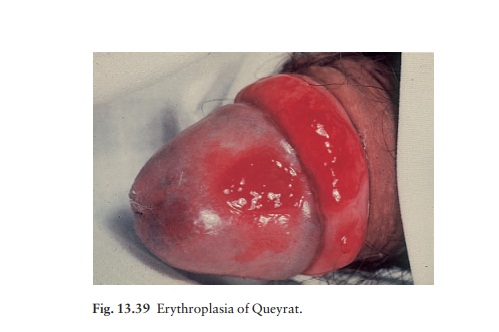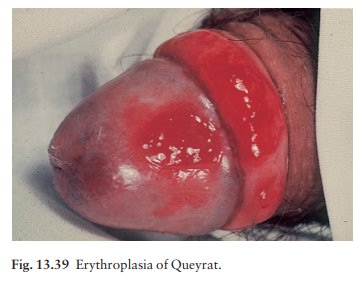Chapter: Clinical Dermatology: Regional dermatology
Malignant conditions: Squamous cell carcinoma

Malignant conditions
Squamous cell carcinoma
Cause
Human
papilloma viruses, especially HPV types 6, 11, 16 and 18, often play a part.
These are sexually trans-mitted, so the risk of carcinoma of the vulva or penis
is greatest in those who have had many sexual partners. Squamous cell carcinoma
of the glans penis is especially common in the uncircumcised. Smegma can incite
inflammation leading to both phimosis and carcinoma. Exposure to tar also
predisposes to scrotal carcinoma. Other predisposing factors are
immunosuppression, lichen sclerosus and, possibly, lichen planus. Cancer can
also develop from bowenoid papulosisagrowths on the penis that resemble dark
seborrhoeic keratoses clinically, and Bowen’s disease histologically. The
female equivalent is vulvar intraepithelial neoplasia.
Presentation
In
men, a glistening irregular red moist patch (Fig. 13.39; Bowen’s
disease/erythroplasia of Queyrat) develops on an uncircumcised penis, either on
the glans or on

Maceration may make it look white until evaporation reveals its
true colour. It enlarges slowly, and invasion and tumour formation may not
occur for years in immunocompetent men. In women, the precursor lesion is often
Bowen’s disease presenting as a sharply marginated, very slowly growing, mildly
hyperkeratotic or slightly scaling, oddly shaped red patch or plaque that is
usually a single lesion on one labia or in the perineum. This may become huge
(up to 10 cm diameter). Sometimes cancer of the penis or labia resembles a
large wart destroying the underlying tissue. Biopsy confirms the diagnosis.
Course
Eventually
the precursor lesions become frankly invasive and capable of metastasizing.
Invasive carci-nomas present either as bleeding ulcerated indurated plaques, or
as tumorous nodules.
Treatment
Mohs’
micrographic excision is probably the best treatment for small and minimally
invasive carcinomas, but partial penectomy is indicated if the tumour is large.
Precursor lesions such as warts, bowenoid papulosis, vulvar intraepithelial
neoplasia and Bowen’s disease can be destroyed with laser surgery or cryotherapy. In some patients, topical
applications of the cytokine-inducer imiquimod cream or the chemotherapeutic
5-fluorouracil cream can be curative.
Related Topics